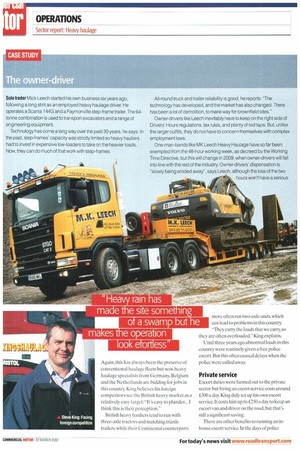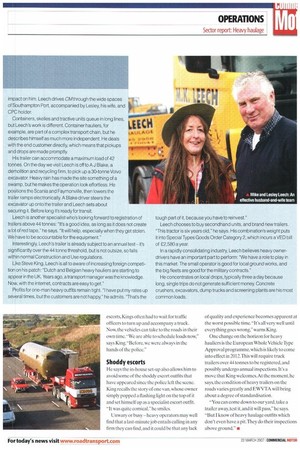larjE i lMfil Sole trader Mick Leech started his own business six
Page 56

Page 57

If you've noticed an error in this article please click here to report it so we can fix it.
years ago, following a long stint as an employed heavy haulage driver. He operates a Scania 144G and a Faymonville step-frame trailer. The 64tonne combination is used to transport excavators and a range of engineering equipment.
Technology has come a long way over the past 30 years, he says. In the past, step-frames' capacity was strictly limited so heavy hauliers had to invest in expensive low-loaders to take on the heavier loads. Now, they can do much of that work with step-frames. All-round truck and trailer reliability is good, he reports: 'The technology has developed, and the market has also changed. There has been a lot of demolition, to make way for brownfield sites."
Owner-drivers like Leech inevitably have to keep on the right side of Drivers' Hours regulations, tax rules, and plenty of red tape. But, unlike the larger outfits, they do not have to concern themselves with complex employment laws.
One-man-bands like MK Leech Heavy Haulage have so far been exempted from the 48-hour working week, as decreed by the Working Time Directive, but this will change in 2009, when owner-drivers will fall into line with the rest of the industry. Owner-drivers' dispensation is "slowly being eroded away", says Leech, although the loss of the two hours won't have a serious impact on him. Leech drives CMthrough the wide spaces of Southampton Port, accompanied by Lesley, his wife, and CPC holder.
Containers, skelies and tractive units queue in long lines, but Leech's work is different. Container hauliers, for example, are part of a complex transport chain, but he describes himself as much more independent. He deals with the end customer directly, which means that pickups and drops are made promptly.
His trailer can accommodate a maximum load of 42 tonnes. On the day we visit Leech is off to A J Blake, a demolition and recycling firm to pick up a 30-tonne Volvo excavator. Heavy rain has made the site something of a swamp, but he makes the operation look effortless. He positions the Scania and Faymonville, then lowers the trailer ramps electronically. A Blake driver steers the excavator up onto the trailer and Leech sets about securing it. Before long it's ready for transit.
Leech is another specialist who's looking forward to registration of trailers above 44 tonnes: "It's a good idea, as long as it does not create a lot of red tape,' he says. "It will help, especially when they get stolen. We have to be accountable for the equipment."
Interestingly, Leech's trailer is already subject to an annual testit's significantly over the 44 tonne threshold, but is not outsize, so falls within normal Construction and Use regulations.
Like Steve King, Leech is all to aware of increasing foreign competition on his patch: "Dutch and Belgian heavy hauliers are starting to appear in the UK. Years ago, a transport manager was the knowledge. Now, with the internet, contracts are easy to get."
Profits for one-man heavy outfits remain tight. "I have put my rates up several times, but the customers are not happy," he admits. "That's the tough part of it, because you have to reinvest."
Leech chooses to buy secondhand units, and brand new trailers. "This tractor is six years old," he says. His combination's weight puts it into Special Types Goods Order Category 2, which incurs a VED bill of E2,580 a year.
In a rapidly consolidating industry, Leech believes heavy ownerdrivers have an important part to perform: "We have a role to play in this market. The small operator is good for local ground works, and the big fleets are good for the military contracts," He concentrates on local drops, typically three a day because long, single trips do not generate sufficient money. Concrete crushers, excavators, dump trucks and screening plants are his most common loads.


























































































































































































